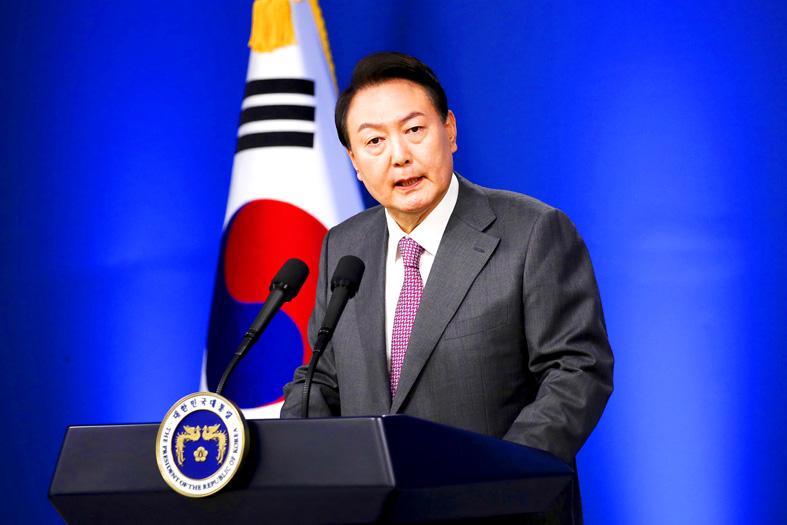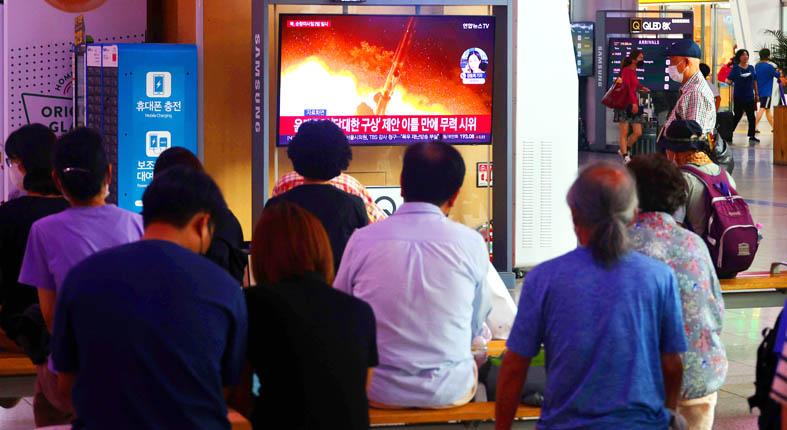Seoul has no plans to pursue its own nuclear deterrent, despite North Korean nuclear threats, South Korean President Yoon Suk-yeol said yesterday as he urged Pyongyang to return to dialogue aimed at exchanging denuclearization steps for economic benefits.
Yoon’s comments at a news conference came hours after South Korea’s military detected the North firing two cruise missiles from a region near its capital toward its western waters.
South Korea’s Joint Chiefs of Staff did not immediately confirm other details, including how far the weapons flew.

Photo: EPA-EFE
The US and South Korea next week are to begin their biggest combined military training in years to counter the North Korean threat.
The North describes such drills as invasion rehearsals often responding with missile launches or other provocative actions.
Yoon told reporters that South Korea does not desire political change in North Korea that is brought by force, and he called for diplomacy aimed at building sustainable peace between the two sides amid tensions over the North’s accelerating weapons program.

Photo: EPA-EFE
Yoon’s comments came days after he proposed an “audacious” economic assistance package to North Korea if it abandons its nuclear weapons program, while avoiding harsh criticism of the North after it threatened “deadly” retaliation over a COVID-19 outbreak it blames on the South.
Yoon expressed hope for “meaningful dialogue” with North Korea over his plan and stressed that Seoul is willing to provide corresponding economic rewards at each step of a phased denuclearization process if the North commits to a genuine “road map” toward fully abandoning its weapons program.
“We are not telling them to ‘denuclearize entirely first and then we will provide,’” Yoon said.
“What we are saying is that we will provide the things we can in correspondence to their steps if they only show a firm determination” toward denuclearization, he added.
Yoon has vowed to strengthen the South’s defenses through its alliance with the US by resuming large-scale military training that was canceled or downsized during the administration of former US president Donald Trump and to boosting the South’s missile defenses.
Some South Koreans have called for the reintroduction of tactical US nuclear weapons that were removed from the South in the 1990s, or for Seoul to pursue its own deterrent.
Yoon dismissed the possibility of the latter during the news conference, saying that Seoul would stay committed to an international treaty aimed at preventing the spread of nuclear weapons.
“I believe the NPT [Non-Proliferation Treaty] regime is a very important and necessary premise for permanent world peace,” Yoon said, expressing hope that the US’ deterrence strategy for its allies could evolve to counter the North’s growing threat.

The US government has signed defense cooperation agreements with Japan and the Philippines to boost the deterrence capabilities of countries in the first island chain, a report by the National Security Bureau (NSB) showed. The main countries on the first island chain include the two nations and Taiwan. The bureau is to present the report at a meeting of the legislature’s Foreign Affairs and National Defense Committee tomorrow. The US military has deployed Typhon missile systems to Japan’s Yamaguchi Prefecture and Zambales province in the Philippines during their joint military exercises. It has also installed NMESIS anti-ship systems in Japan’s Okinawa

‘WIN-WIN’: The Philippines, and central and eastern European countries are important potential drone cooperation partners, Minister of Foreign Affairs Lin Chia-lung said Minister of Foreign Affairs Lin Chia-lung (林佳龍) in an interview published yesterday confirmed that there are joint ventures between Taiwan and Poland in the drone industry. Lin made the remark in an exclusive interview with the Chinese-language Liberty Times (the Taipei Times’ sister paper). The government-backed Taiwan Excellence Drone International Business Opportunities Alliance and the Polish Chamber of Unmanned Systems on Wednesday last week signed a memorandum of understanding in Poland to develop a “non-China” supply chain for drones and work together on key technologies. Asked if Taiwan prioritized Poland among central and eastern European countries in drone collaboration, Lin

BACK TO WORK? Prosecutors said they are considering filing an appeal, while the Hsinchu City Government said it has applied for Ann Kao’s reinstatement as mayor The High Court yesterday found suspended Hsinchu mayor Ann Kao (高虹安) not guilty of embezzling assistant fees, reducing her sentence to six months in prison commutable to a fine from seven years and four months. The verdict acquitted Kao of the corruption charge, but found her guilty of causing a public official to commit document forgery. The High Prosecutors’ Office said it is reviewing the ruling and considering whether to file an appeal. The Taipei District Court in July last year sentenced Kao to seven years and four months in prison, along with a four-year deprivation of civil rights, for contravening the Anti-Corruption

NO CONFIDENCE MOTION? The premier said that being toppled by the legislature for defending the Constitution would be a democratic badge of honor for him Premier Cho Jung-tai (卓榮泰) yesterday announced that the Cabinet would not countersign the amendments to the local revenue-sharing law passed by the Legislative Yuan last month. Cho said the decision not to countersign the amendments to the Act Governing the Allocation of Government Revenues and Expenditures (財政收支劃分法) was made in accordance with the Constitution. “The decision aims to safeguard our Constitution,” he said. The Constitution stipulates the president shall, in accordance with law, promulgate laws and issue mandates with the countersignature of the head of the Executive Yuan, or with the countersignatures of both the head of the Executive Yuan and ministers or